Sinningia hoehnei
This species was known under the temporary holding name of Sinningia sp. "Castelo".
It resembles Sinningia barbata in flower and stem.
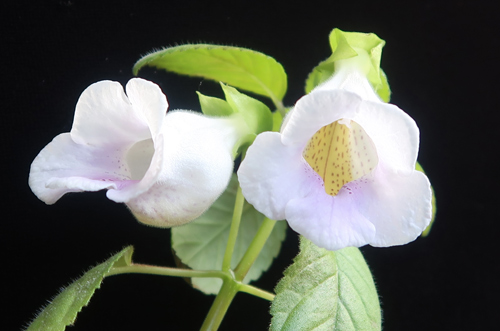
| Species list |
Hybrids list |
Tubers list |
Topics list |
Site index |
What's new |
Home page |
Sinningia hoehneiThis species was known under the temporary holding name of Sinningia sp. "Castelo". It resembles Sinningia barbata in flower and stem. |

|
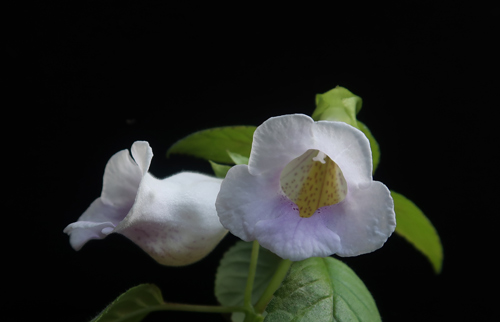
|
Although its Its flowers somewhat resemble those of S. barbata, the L-bend in the corolla is not as pronounced, the mouth of the corolla is more open, and the inside of the corolla is yellow with purple streaks. The lower lobe in particular is pale purple. Corolla shape is reminiscent of that of Sinningia eumorpha, to which it is not closely related. The similarity is presumably due to convergent evolution focused on the same pollinator type (a bee). This species was found at a single location in Espírito Santo state of Brazil. |
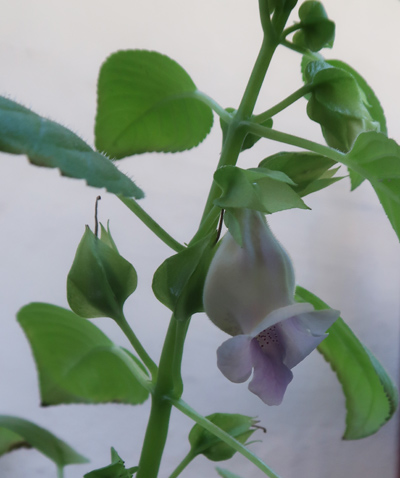
|
Under my conditions, the flowers of this species self-pollinate. Following pollination, the pedicel elongates and the calyx turns to face upward. The picture shows the result, The developing fruit is held more or less vertically. The result is a "splash cup". The fruit eventually dehisces (breaks open), exposing the seeds to the rain, which should result in the seeds being scattered. Unusually for the genus Sinningia, the seeds are black. |
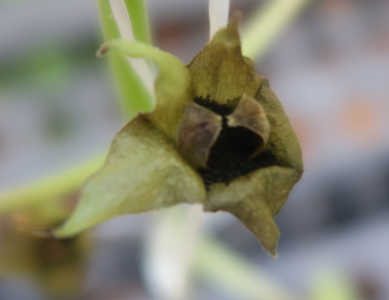
|
This picture shows the splash cup with the exposed seeds. |
|
|
|
TuberOnce the plant went dormant at the end of 2019, it was dug up to find out if it had a tuber. This was the primary, but there were also two secondary tubers. All the tubers were at least 2 cm below the soil line. The tubers sprouted normally in the spring of 2020. |
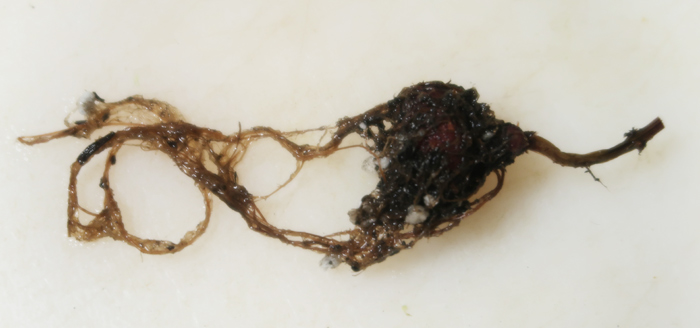 |
|
|
|
| Plant Description |
|
| Growth | Indeterminate |
| Habit | Stem erect or sprawling, usually unbranched |
| Leaves | Opposite, green |
| Tuber | See above |
Flowering |
|
| Inflorescence | Axillary cyme, 1 flower |
| Season | Autumn |
| Flower | See above |
Horticultural aspects |
|
| Hardiness | No information, but its relative S. barbata does not tolerate freezing temperatures well. |
Botany |
|
| Taxonomic group | Related to S. barbata in the Corytholoma clade. |
| Pollinator | Presumably a bee, judging by corolla shape, color, and markings. |
| Seeds | Black. |
External LinkMauro Peixoto's Brazilian Plants site has a page for this species. PublicationEtymology: named after Brazilian botanist Frederico Carlos Hoehne (1882-1959), whose illustration of this species under the name Sinningia barbata was published after his death. Mr. Hoehne published the initial descriptions (see also the chronological table) of four sinningia species (all under the name Rechsteineria): |